V.
Mednarodni komparativistični kolokvij
Literatura in cenzura:
Kdo se boji resnice literature?
Literature and Censorship:
Who is
Afraid of the Truth of Literature?
(program in povzetki referatov / programme and
paper abstracts)
fotografije / photos
22. Mednarodni
literarni festival Vilenica
22nd
Vilenica International Literary Festival
Lipica, Slovenija, Poročna dvorana / Lipica, Wedding Hall, 6.-7.
September 2007
Vodji kolokvija
/ Directors of the colloquium
Marijan DOVIĆ, Gašper TROHA
Udeleženci /
Participants
Salah S. ALI (Kristiansand;
Norveška - Irak / Norway - Iraq)
Guido BONSAVER (Oxford University, Faculty of Medieval and Modern Languages,
Oxford; VB / GB)
Marijan DOVIĆ (Inštitut za slovensko literature in literarne vede ZRC SAZU,
Ljubljana; Slovenija / Slovenia)
Peter DUNWOODIE (Goldsmiths – University of London, Comparative Literature,
London; VB / GB)
Aleš GABRIČ (Inštitut za novejšo zgodovino, Ljubljana; Slovenija / Slovenia)
Aleksandra JOVIĆEVIĆ (School of Drama, University of Arts, Belgrade; Srbija /
Serbia)
Louise L. LAMBRICHS (Paris; Francija / France)
Stephan PACKARD (München University, Comparative Literature; Nemčija / Germany)
Rok SVETLIČ (Fakulteta za humanistične študije, Koper / Filozofska fakulteta,
Ljubljana; Slovenija / Slovenia)
Simona ŠKRABEC (Barcelona; Španija / Spain)
Gašper TROHA (Filozofska fakulteta, Oddelek za primerjalno književnost in
literarno teorijo, Ljubljana; Slovenija / Slovenia)
Andrej ZAVRL (Ljudska univerza Kranj, Kranj; Slovenija / Slovenia)
Posebna
gosta / Special guests
Breda SMOLNIKAR
(pisateljica / writer, Slovenija / Slovenia)
Matjaž PIKALO (pisatelj / writer, Slovenija / Slovenia)
Organizacija / Organisation
Slovensko društvo za primerjalno književnost
Slovenian Comparative Literature Association
Soorganizacija / Co-organisation
Društvo slovenskih pisateljev
Slovene Writers’ Association
Inštitut za
slovensko literature in literarne vede ZRC SAZU
The Institute of Slovenian Literature and Literary Sciences, SRC SASA
Oddelek za
primerjalno književnost in literarno teorijo
Department for Comparative Literature and Literary Theory
(Univerza v Ljubljani / University of Ljubljana)
Finančna
podpora / Financial support
Ministrstvo za kulturo RS
PROGRAM KOLOKVIJA / THE PROGRAMME OF THE
COLLOQUIUM
Četrtek, 6. septembra / Thursday, September 6th
15.00 Pozdravni nagovor / Adress
Vanesa MATAJC, predsednica SDPK / SiCLA president
15.15 – 16.15 Prvo zasedanje / First session
Marijan DOVIĆ: Literatura in cenzura: uvodne pripombe / Literature and Censorship: An Introduction
Guido BONSAVER: Mussolini, fašizem in literarna cenzura / Mussolini, Fascism and Literary Censorship
Salah S. ALI: Ideologija, cenzura in literature: Irak kot študija primera / Ideology, Censorship and Literature: Iraq as a Case Study
16.15 – 16.45 Diskusija / Discussion
16.45 – 17.00
Odmor / Coffee break
17.00 – 18.30 Drugo zasedanje / Second session
Aleš GABRIČ: Cenzura v Sloveniji po 2. svetovni vojni / Censorship in Slovenia after the Second World War
Aleksandra JOVIĆEVIĆ: Cenzura in strategije dramatike v jugoslovanskem gledališču med letoma 1945 in 1991/ Censorship and Ingenious Dramatic Strategies in the Yugoslav Theatre, between 1945 and 1991
Peter DUNWOODIE: Nepravočasno vnovično pisanje. Spomin in samocenzura v Camusevem Prvem človeku / Untimely Rewriting. Memory and Self-Censorship in Camus' Le Premier homme
18.00 – 18.30 Diskusija / Discussion
18.30 Odhod na literarna branja v Lokev /
Leaving for literary readings in Lokev
Petek, 7. septembra / Friday, September 7th
10.00 – 11.15 Tretje zasedanje / Third session
Rok SVETLIČ: Cenzurni krivdorek kot mesto zloma pozitivističnega pravnega diskurza / Judicial Censorship as Place of Breakdown of Positivistic Jurisprudential Discourse
Louise L. LAMBRICHS: Govor o cenzuri zahteva natančnost glede njenega domnevnega predmeta: primer afere Handke / Speaking about Censorship Supposes Being Precise about What is Supposed to be Censored: Handke’s Affair as a Case Study
Gašper TROHA: Socialistična in demokratična cenzura na Slovenskem: Primer predstave Pupilija papa Pupilo pa Pupilčki / Socialistic and Democratic Censorship in Slovenia: the Case of Pupilija papa Pupilo pa Pupilčki
Matjaž PIKALO, Breda SMOLNIKAR: “Cenzorirana” slovenska pisatelja / Censored Slovene Writers
11.15 – 11.45 Diskusija / Discussion
11.45 – 12.00 Odmor / Coffee break
12.00 – 13.00 Četrto zasedanje / Fourth session
Stephan PACKARD: Zavajajoče predstavljanje tekstualnega nadzora: cenzorske upodobitve cenzure / Misrepresenting Textual Control: Censorship’s Depictions of Censorship
Andrej ZAVRL: Slačenje literarne zgodovine. Cenzura istospolne želje / Undressing Literary History. The Censorship of Same-Sex Desire
Simona ŠKRABEC: Pesniška svoboda / Poetic License
13.00 – 13.30 Diskusija in sklepne besede / Discussion and conclusion
13.30 Kosilo v hotelu Klub / Lunch at the Club hotel
15.30 Odhod v Ljubljano / Transport to Ljubljana *
17.00 Literarna branja (irski avtorji) / Literary readings (Irish authors)
* vrnitev v Lipico pozno zvečer / return to Lipica late at nightFOTOGRAFIJE / PHOTOS
(Matjaž Zaplotnik)
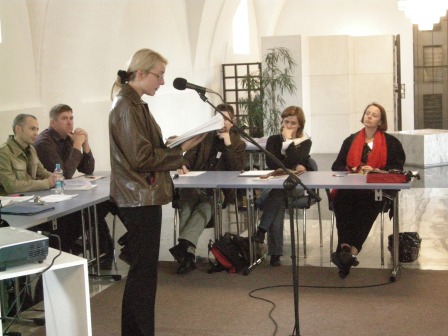
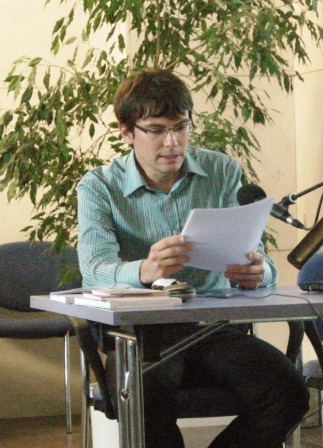
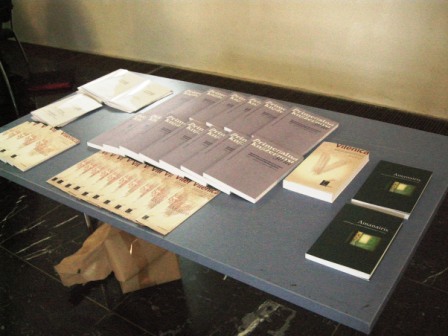
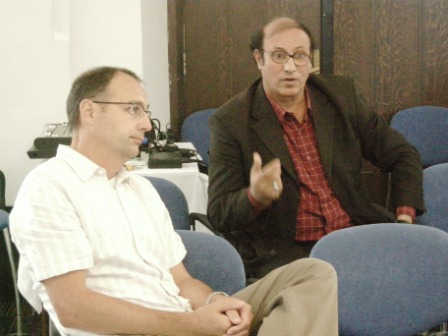
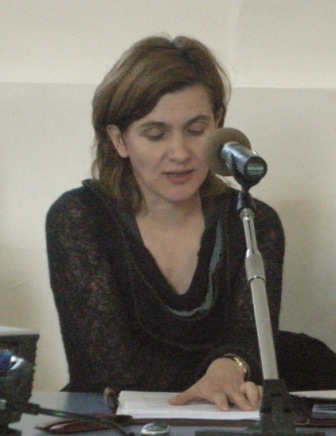
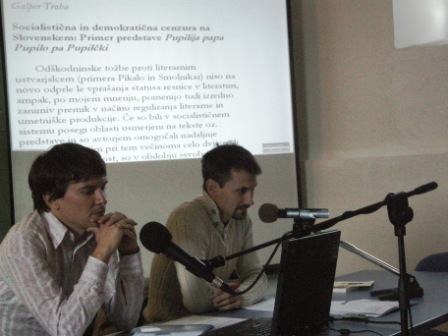
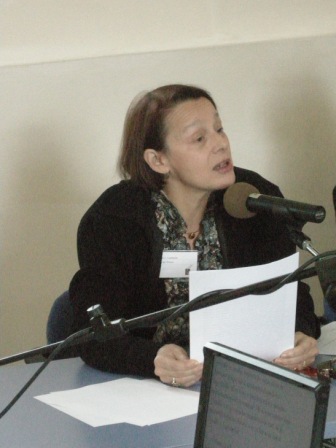
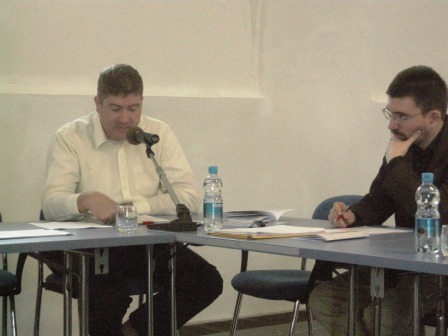
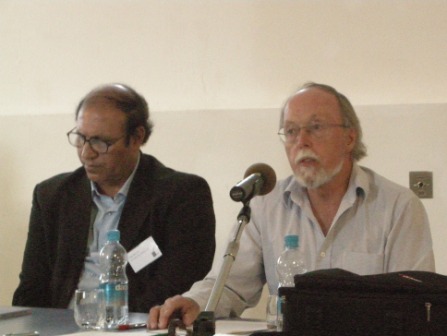
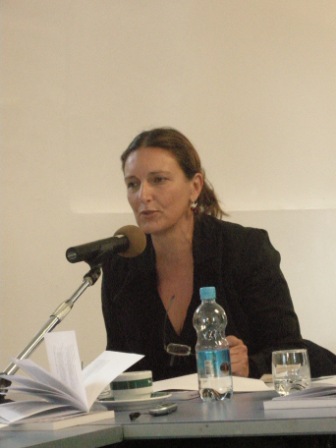
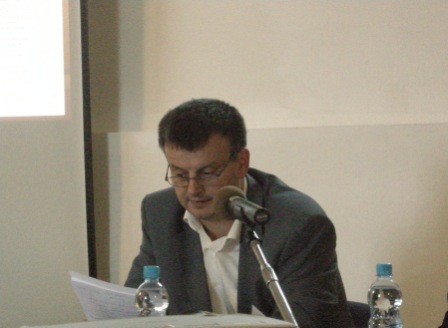
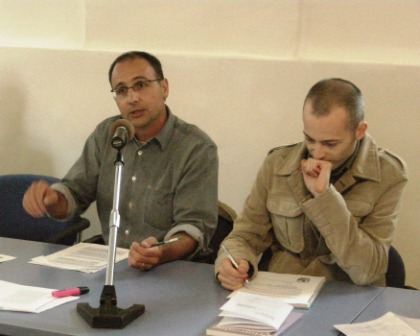
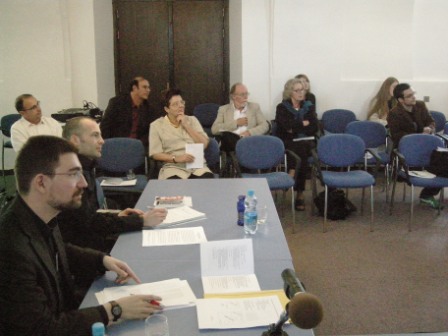
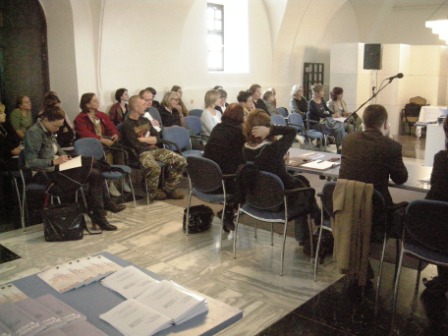
POVZETKI REFERATOV /
PAPER ABSTRACTS
Marijan Dović
Literatura in cenzura:
koncept kolokvija
Cenzura in
literatura sta tesno povezani že od nekdaj. Oblastniki in drugi nosilci družbene
moči so v vseh obdobjih skušali nadzirati pretok idej v družbi in omejiti
vpliv tistih, ki so bile potencialno škodljive njihovim interesom. V ta namen so
oblikovali različne postopke, ki jih je mogoče imenovati s skupnim izrazom
cenzura. Ta zajema vse oblike regulacije obtoka idej, ki jih je mogoče
razvrstiti od grobih (represivni aparat: sodstvo, po potrebi policija ali
celo vojska) do mehkih, subtilnejših variant (izključitve, katalogi
nezaželenih avtorjev, omejevanje dostopa). Pomembno ločnico je mogoče postaviti
med eksplicitnimi in implicitnimi oblikami cenzure. Eksplicitna cenzura
pomeni relativno jasno zamejitev prepovedanih območij in transparenten sistem
sankcioniranja kršitev. Implicitna cenzura, značilna za komunistične
totalitarizme 20. stoletja, po drugi strani dopušča široko polje nedorečenosti,
ni docela jasno, kdaj je prestopljena meja; ni pa docela jasno niti, kakšne
kazni lahko doletijo kršitelja. Poleg tega je koristno razlikovati še med
predhodno in represivno cenzuro. Medtem ko predhodna cezura
zagotavlja vnaprejšnjo kontrolo vsake objave, represivna ugotavlja spornost že
objavljenega za nazaj, to po potrebi zapleni ter kršitelje sodno preganja. Glede
na prepovedana območja pa je mogoče ločiti moralno (etično in
religiozno sporna dela, seksualno eksplicitna, »obscena«), politično (varovanje
interesov države, vojske, državne kohezije, »politična korektnost«) ter za
današnji čas značilno korporativno cenzuro (filtriranje vsebin v medijih,
npr. neugodnih informacij o oglaševalcih).
Cenzura v praksi nikdar ne prepoveduje nečesa v praznem prostoru, temveč vedno skuša regulirati pretok vsebine v določenem komunikacijskem mediju. Zato so se konkretne oblike cenzure v različnih obdobjih spreminjale, medtem ko sta osnovi princip in funkcija ostajala podobna: ohranjanje vpliva, moči in oblasti. Sodobna informacijska družba v tem pogledu pomeni radikalen prelom glede na pretekle oblike: ob predpostavki, da so težnje po cenzuriranju še vedno prisotne, se pojavlja vprašanje, v kakšni obliki se v dobi globalne podatkovne pretočnosti in možnosti neskončnega podvajanja in distribuiranja vsebin ohranjajo cenzurni postopki in njihovi učinki. Znanstveni sistemi opazovanja družbe imajo odgovornost, da te oblike prepoznajo in opišejo.
Zgodovina cenzure kaže, da so bila njen predmet v različnih družbenih okoljih zelo različna dela, od religioznih (Koran, Biblija, heretični in apokrifni spisi …) in filozofskih do znanstvenih (Kopernik, Bruno,Galilei, Darwin …) in literarnih. Številne mojstrovine iz kanona svetovne literature so bile v določenih obdobjih cenzurirane, okrnjene, njihove avtorje so sodno preganjali in jih uvrščali na negativne liste; najpogosteje iz moralnih in političnih vzgibov. S tako ali drugačno obliko moralno-ideološke cenzure so se srečevale Chaucerjeve Canterburyjske zgodbe (ok. 1400), Flaubertova Gospa Bovary (1857), Lawrenceov Ljubimec Lady Chatterley (1928) ter niz manj uspešnih literarnih del. Iz pretežno socialno-političnih razlogov so cenzuro doživljala dela, kot so Voltairov Kandid (1759), Koča strica Toma Stowove (1852) in literatura v komunističnih deželah, denimo dela Pasternaka (Doktor Živago) in Solženicina (Arhipelag Gulag).
Na prvi pogled ni mogoče reči, da bi cenzorji načelno ločevali med cenzuriranjem literarnih in neliterarnih gradiv. Pa vendar so ravno literarna dela njihova pogosta in priljubljena tarča – ne glede na to, da se je literatura vsaj od predromantike dalje obdajala z obstretom literarno-umetniške avtonomije in da je teoretski diskurz hkrati razvijal močne argumente o posebni strukturi, funkcijah in zakonih umetnosti, med katerimi je v primeru cenzure eden najpomembnejših razdelava opozicije med »fikcijo« in »resničnostjo«. Mogoče je sklepati, da je avtonomni literarni sistem, kakršen se je razvijal v novoveški Evropi, v resnici odpiral enkraten in specifičen prostor artikulacije temeljnih družbenih problemov. Številni primeri kažejo, da je delovanje na literarnem polju odpiralo nove možnosti za ustvarjalno izražanje posebnih družbenih uvidov, ki so bili pogosto v nasprotju z vladajočimi ideologijami in družbenimi normami. Še posebej očitno se je to izkazalo v totalitarnih ali avtoritarnih družbah, kjer je (disidentska) literatura postala prizorišče temeljnih spoznavnih in etičnih refleksij.
Vprašanje posebne resnice in vrednosti literature je že dolgo na dnevnem redu različnih ved, od filozofije in zgodovinopisja do literarne vede. Nadvse ostrovidno je bilo zastavljeno že v antiki, v znamenitem sporu med Platonovim in Aristotelovim videnjem in vrednotenjem literature. Dobro je znano, da je Platon iz svoje idealne Države pregnal poezijo in pesnike iz pretežno moralističnih vzrokov; medtem ko je Aristotel v Poetiki postavil odmevno tezo o partikularnosti oziroma singularnosti resnice zgodovinopisja v nasprotju s celovitostjo oziroma splošnostjo literarne resnice. Aristotelova teza je odmevala vse do danes, ko si literaturo – tudi pod vplivom romantične konsolidacije avtorskega mita – še vedno predstavljamo kot nosilko neke posebne resnice. Številne diskusije, tudi take, ki so to predstavo radikalno spodbijale, so pokazale predvsem, da se je o pomenu, resnici in družbeni vrednosti literature treba vedno znova pogajati.
Poleg študija konkretnih zgodovinskih primerov literarnega cenzuriranja je zato spodbujanje nadaljnje diskusije v tej smeri ena od temeljnih prioritet kolokvija. Brez odgovorov na ta vprašanja se namreč literarna stroka težko spopade z izzivi, ki jih pred njo postavlja sedanji čas. Eden od takšnih izzivov, povezanih s cenzuro, so tudi trki med literarnim in pravnim sistemom v primerih literarnega obrekovanja, kakršnim smo bili nedavno priča tudi v Sloveniji (primera Pikalo, Smolnikar). Enostaven argument, da je literatura pač le izmišljija, se je upravičeno izkazal za nezadostnega. Obramba literarne avtonomije zahteva kompleksnejšo analizo odnosov med resničnostjo in fikcijo – od zamisli o kvazirealnosti (Ingarden) do sodobnejših konceptov, kot so preksvetna identiteta, fikcijski operator ali polireferencialnost (Doležel, Lamarque – Olsen, Ronen, Whiteside; gl. Juvan 2006). Ena od nalog literarnih strok in komparativistike, pa tudi letošnjega kolokvija, je tudi ustvarjanje prepričljivih teoretskih argumentov, s katerimi bo mogoče nastopiti v bodočih pravnih sporih, v katerih se bodo na novo postavljala razmera med pravom, literaturo in cenzuro.
Teme kolokvija
- Zgodovinski primeri cenzuriranja literarnih del (sodni procesi, pregoni, izključitve; od antike do današnjih dni)
- komunikacijski kanali, ideološki mehanizmi in realni doseg cenzurnih ukrepov
- cenzura in samocenzura v totalitarnih družbah
- vprašanje transformiranja cenzurnih praks v sodobnosti
- Teoretični prispevki o specifiki in pomenu resnice in etosa literature, ki sta (bila) dejanski razlog za cenzuro ali sodni pregon
- posebna resnica in etos literature
- literatura in pravo: problem leposlovnega obrekovanja
-
nove
konceptualizacije odnosa »resničnost« – »fikcija«
Marijan Dović
Literature and Censorship: The concept of the Colloquium
Censorship and literature have been closely connected for quite some time. The
rulers and other influential interest groups have always tried to control the
circulation of ideas in a society and confine the influence of those that
were potentially harmful to their interests. In order to do so a variety of
procedures was developed which can be described with the term censorship.
The term covers all forms of regulation of the circulation of ideas, spanning
from brutal (repressive apparatus: judiciary, police, even army) to
softer, more sophisticated models (exclusions, lists of forbidden books or
authors, restricted access). An important distinction can be made between
explicit and implicit forms of censorship. While the explicit censorship
relatively clearly sets out the forbidden areas and offers a transparent system
of sanctioning the violations, the implicit censorship, well known in
communist regimes of the 20th century, deliberately leaves a wide range of
openness; it is never completely clear when the border has been transgressed, as
well as it is not clear what kind of sanctions can follow. It is also possible
to distinguish between preliminary (preventive) and repressive
censorship. While the preliminary censorship guarantees the precursory control
of any publication, the repressive censorship takes place after the problematic
work is published; if necessary, it seizes the work, prosecutes the authors, etc.
Finally, concerning the prohibited areas, one can distinguish moral
(ethically problematic or »obscene« works), political (interest of
the state, army, »political correctness«) and, for the present time
characteristic, corporate censorship (filtering media contents, for
example leaving out the unfavorable information about the advertisers).
In practice, censorship never prohibits something in a vacuum. It always tries to regulate the circulation of content in a certain communication medium. This is the reason why the forms of censorship in the course of time have changed significantly, while the basic principle and function have remained intact: preservation of power, authority and influence. Contemporary information society represents a radical break compared to previous forms: if one supposes that the tendencies for censoring are still there, a question appears, how in the age of global interconnectedness and possibility of endless reduplication and virtual distribution of contents, the censoring procedures and its effects are being preserved. The scientific systems, that are the privileged observers of the society, are definitely responsible for identification and description of such forms.
History of censorship shows that different kinds of works, varying from religious (Quran, Bible, heretical or apocryphal writings) and philosophical to scientific (Kopernik, Bruno,Galilei, Darwin) and literary, were its subject in different societies. Numerous masterpieces of world literature canon were at some time censored, mutilated; their authors were prosecuted or placed on lists of prohibited literature; usually for moral or political reasons. Certain form of moral-ideological censorship met Chaucer's Canterbury Tales (around 1400), Flaubert’s Madame Bovary (1857), Lawrence's Lady Chatterley's Lover (1928) and many other, less famous works. For social and political reasons Voltaire's Candid (1759), Stowe's Uncle Tom's Cabin (1852) and literature in communist countries (works of Solzhenicin or Pasternak) were censored.
At first glance, one could not say that censors would principally distinguish between censoring literary or non-literary materials. Nevertheless, literary works were obviously their frequent and favorite target – despite the fact that literature (at least from the Pre-Romantic era) has been developing an aura of artistic autonomy and that the theoretical discourse was simultaneously producing various arguments of a special structure, function and autonomous laws of art (one of the most important arguments was the elaboration of complex opposition between »reality« and »fiction«). Autonomous literary systems, which developed in modern Europe, actually created a unique space for the articulation of fundamental dilemmas of the society. Many examples show that the engagement in the literary field opened up new opportunities for creative expression of special insights that were often conflicted with the prevailing ideologies and social norms. This special role of literature was even more visible in the totalitarianisms of the 20th century, where the (dissident) literature functioned as the scene of the most decisive ethical reflections.
The question of special truth and value of literature has repeatedly been posed for quite some time. With all sharpness it appeared already in ancient Greece in the famous quarrel between Plato and Aristotle on the value of literature. As it is well known, Plato drove poetry and poets out of its ideal Republic mainly for moral reasons, while Aristotle in his Poetics launched an influential thesis on the particularity of the historiographical truth compared to the wholeness and universality of the literary truth. Aristotle's thesis echoes until the present day in a notion of literature as a holder of a special truth, a notion which was only consolidated by the romantic authorial myth. Numerous discussions, also the ones that were trying to radically undermine this conception, showed that the relevance, truth, ethical and social value of literature have to be negotiated all the time.
Besides the study of historical examples of literary censorship a stimulation of such discussion is one of the primary goals of the colloquium. Without the responds to these questions the literary science can hardly face the challenges of the present time. One of such challenges, connected with censorship, is also a collision between literature and law in the cases of literary defamation, recently witnessed also in Slovenia (cases Pikalo and Smolnikar). A simple argument that the literature is just an invention has righteously proved to be insufficient. The defence of literary autonomy calls for far more complex analysis of the relations between fiction and reality – from older ideas of quasi-reality (Ingarden) to more recent concepts such as transworld identities, fictional operators or polyreferentiality (Doležel, Lamarque – Olsen, Ronen, Whiteside). One of the tasks of literary sciences and comparative literature is also production of persuasive theoretical arguments, which will enable them to take active part in the future, when new relations among law, literature and censorship will be established.
Themes of the Colloquium
- Historical cases of literary censorship (prosecutions and exclusions from antiquity until the present day)
- Communication channels, ideological mechanisms and the actual range of censorship measures
- Censorship and auto-censorship in totalitarianisms
- The question of transformation of recent censorship practices
- Theoretical contributions on the specific significance of the literary truth and ethics, which were the true reason for censorship or prosecution
- Special truth and ethics of literature
- Literature and law: the problem of literary defamation
-
New
conceptualisations of the relationship »reality« - »fiction«
Guido Bonsaver
Mussolini, fašizem in literarna cenzura
Poglavitni namen prispevka je razprava o pravnem okviru in dejanski praksi, s pomočjo katere je fašistični režim v Italiji skušal nadzirati literarno produkcijo. Pod drobnogled sta vzeti Mussolinijeva vloga »prvega cenzorja« režima in njegova centralizacija sistema nadzora nad založniško industrijo. Mussolinijeva Tiskovna pisarna je hitro prerasla v mogočno organizacijo, ki se je občasno prekrivala z obstoječim sistemom nadzora na ravni lokalnih prefektur, pozneje pa se je razvila v Ministrstvo za tisk in propagando ter končno v Ministrstvo za popularno kulturo. Mogoče je potegniti številne vzporednice med temi fašističnimi institucijami in njihovo nacistično dvojnico, tj. Goebbelsovim Propagandnim ministrstvom, ustanovljenim v prvih mesecih Hitlerjevega predsednikovanja v letu 1933.
V prispevku bodo obravnavani odzivi vodilnih založnikov in posameznih avtorjev na nove kulturne direktive, ki so jih hoteli vsiliti fašisti. Ti odzivi variirajo od odprtega nasprotovanja – na primer Gobettijeve založniške pobude – do sporazumne kolaboracije, o kakršni pričata primera založnikov Mondadori ali Vallecchi. Obravnavana bodo tudi druga sredstva, s pomočjo katerih je režim izvajal pritisk na založniško industrijo: podeljevanje finančnih ugodnosti, direktive časopisom ter (nezakonite) posredne in neposredne grožnje. Omenjena bosta tudi povezava med fašističnim režimom in Vatikanom, ki je predstavljal dodaten potencialni vir cenzure na italijanskem polotoku, ter vpliv anti-semitske cenzurne zakonodaje iz leta 1938, katere diskretno uvajanje s tihim pristankom založnikov doslej še ni bilo deležno zadostne znanstvene pozornosti. Končni rezultat tega obžalovanja vrednega razvoja dogodkov je bilo kroženje »Seznama v Italiji nezaželjenih avtorjev«, ki je obsegal imena približno 900 avtorjev (večinoma) judovskega porekla.
Guido Bonsaver
Mussolini, Fascism and Literary Censorship
The main aim of this paper is to discuss the legal framework and the actual practices through which the Fascist regime attempted to control Italy’s literary production. Mussolini’s role as “prime censor” of the regime will be examined together with his centralisation of the control system over the publishing industry. The development of his Press Office into a powerful organization sometimes overlapping with the existing system based around local Prefectures will be charted down to its later development as Ministry for Press and Propaganda and finally as Ministry of Popular Culture. Parallels will be drawn between these Fascist institutions and their Nazi equivalent that is, Goebbels’ Ministry of Propaganda, created in the first months of Hitler’s premiership in 1933.
The paper will also examine the
response of major publishing houses and individual authors to the new cultural
directives imposed by the Fascists. It will discuss a number of examples,
ranging from open opposition – as was the case of Gobetti’s publishing
initiatives - to consensual collaboration – as exemplified by publishers such as
Mondadori and Vallecchi. It will also provide some examples of other means
through which the regime exerted pressure on the publishing industry, like
granting financial favors, directives to the press and illegal means such as
direct and indirect threats. Mention will be made of the relationship between
Fascist authorities and the Vatican, another potential source of censorship in
the Italian peninsula. Finally, the paper will chart the impact of the anti-Semitic
legislation of 1938 on book censorship. Its discreet introduction through the
submissive collaboration of publishing houses has, until recently, received
little scholarly attention. The final step of this deplorable development was
the circulation of the “Elenco di autori non graditi in Italia” in 1942, which
contained the names of about 900 authors, mainly of Jewish origin.
Salah S. Ali
Ideologija, cenzura in literature: Irak kot študija primera
V sedemdesetih letih prejšnjega stoletja je vladajoča iraška stranka Baas začela izvajati revizionistično politiko, v okviru katere se je pričelo vnovično pisanje arabske zgodovine na tak način, ki je ustrezal strankini ideologiji. Da bi uveljavila novo politiko, je oblast uvedla koncept in prakso intelektualne varnosti oziroma »preventivo pred miselnimi zločini«, ki so jo izvajali vsi organi stranke, vlada in tudi izobraževalni sistem. Posledica te politike je bila preplavitev iraških knjigarn, knjižnic in izobraževalnih ustanov z množico akademskih raziskav, literarnih in neliterarnih študij, zgodovinskih knjig in enciklopedij.
Sledenje aktualni politiki je seveda narekovalo izključevanje vseh drugačnih in vključitev aktualnih predsodkov, zabrisovanj in pretiravanj; poveličevanje Arabcev in vsega arabskega ter omalovaževanje vsega, kar ni arabsko. Zabrisani ali zamolčani so bili številni barviti aspekti iraške zgodovine, namesto tega pa sta bili spodbujeni ksenofobija in podrejanje drugačnih. Cenzura v Iraku nikdar ni bila tako aktivna kot v času vladavine stranke Baas. Pomagala je zgraditi lažno zgodovino iraških Arabcev, kakršna v veliki meri prispeva k izbruhom nasilja, ki še vedno pretresajo deželo. S svojim prispevkom bom skušal podrobneje pojasniti te vidike in povezati tri nekoliko nasprotujoče si konstrukte: Ideologijo, Cenzuro in Literaturo.
Salah S. Ali
Ideology, Censorship and Literature: Iraq as a Case Study
In the 1970s the ruling Baath party in Iraq adopted a policy of revisionism which stressed the significance of rewriting Arab history so as to make it fit Baathist ideology. To implement this policy the government took the lead in establishing the concept and practice of intellectual safety i.e. “thought crime prevention authority” that was exercised by all party members and government departments including the educational system. In consequence, a huge corpus of research literature, literary and non-literary studies besides academic dissertations, history books and encyclopedias overwhelmed bookstores, libraries and educational institutions all over Iraq.
Practically, pursuing such policy necessitates the exclusion
of the others, whether non-Arab Muslims, Orientalists, or what the Arab
historians brand as ‘the modern crusaders’. It also involves the active
inclusion of prejudices, obliterations and exaggerations in favour of self-aggrandizement
of the Arabs and all that is Arabic and the subordination of all that is non-Arab
and non-Arabic. The black list tried to erase numerous colorful aspects of Iraqi
history, encouraged xenophobia and the subordination of the other. Censorship
had nowhere been as active as it was in Iraq during the Baathist reign. It built
up history in the inner self of Iraqi Arabs and as such it accounts greatly for
the violence that is still conflagrating in Iraq. My paper tackles these aspects
in detail trying to link up the three rather conflicting constructs of Ideology,
Censorship and Literature.
Aleš Gabrič
Cenzura v Sloveniji po 2. svetovni vojni: od komunističnega Index librorum prohibitorum do ukinitve t.i. verbalnega delikta
Prve načrte za povojno čistko v knjižnicah so oblikovali pristojni organi osvobodilnega gibanja še pred koncem vojne na osvobojenem ozemlju. Po prvotni zasnovi naj bi bila tarča pri čiščenju knjižnic in knjigarn, tako kot v vseh med vojno okupiranih evropskih deželah, predvsem propagandistična literatura poraženih nasprotnikov iz vojnih let. Toda v Sloveniji (oziroma Jugoslaviji), kjer je po vojni zavladala Komunistična partija, je bila akcija čiščenja knjižnic in knjigarn dejansko zastavljena precej širše. Na končnem »seznamu iz prometa izločenih knjig« (oziroma slovenski komunistični index librorum prohibitorum), lahko najdemo tudi precej literarnih del. Na seznam so vključili tudi literarna dela slovenskih pesnikov in pisateljev, ki so bili med vojno nasprotniki osvobodilnega gibanja in so po vojni pred komunistično oblastjo emigrirali, so med vojno padli v vojaških enotah kolaboracije ali bili ubiti neposredno po vojni v času obračunavanj nove oblasti s političnimi nasprotniki. Razen v redkih primerih se imena teh avtorjev in njihovo delo v Sloveniji ni omenjalo do padca komunističnega režima v začetku devetdesetih let 20. stoletja.
V letih 1945-1952 je knjižno
ponudbo nadzoroval oddelek za agitacijo in propagando Komunistične partije (bolj
znan po skrajšanem imenu agitprop). Čeprav ni imel nikakršnih formalnih
pristojnosti, je bil ena najbolj učinkovitih cenzurnih služb svojega časa.
Nadzor nad knjižno produkcijo mu je omogočalo tudi dejstvo, da so po vojni z
izjemo ene ukinili vse predvojne založbe, podržavili vse knjigotrške
zmogljivosti in na teh temeljih ustanovili nove založbe, ki so bile vse v rokah
državnih ali političnih organov in imele natančno zamejeno področje delovanja. V
času t.i. agitpropovske kulturne politike je šlo za klasični primer zelo ostre
celovite cenzure, tako naknadne oziroma suspenzivne z izločanjem že natisnjenih
knjig iz knjižnic in knjigarn, kot predhodne oziroma preventivne cenzure, ko
dela, ki so opisovala karkoli, kar ni bilo po volji oblasti, preprosto niso
mogla biti natisnjena.
Z zakonodajo, sprejeto sredi petdesetih let, je bilo uvedeno t.i.
družbeno upravljanje kulturnih ustanov. Te so dobile upravne odbore, ki so bili
sestavljeni iz manjšinskega dela predstavnikov kolektiva in večinskega dela
predstavnikov ustanovitelja. Ker je bila ustanovitelj večine kulturnih ustanov
država, je ta torej imenovala tudi večino vodstvenih članov kulturnih ustanov. Z
uvedbo takšnega sistema je bil vzpostavljen domišljen sistem preventivne
cenzure. Delo, ki ga je vsemogočna oblast ocenila kot tako ali drugače spornega
ali neprimernega, sploh ni prišlo v javnost. Če je bilo v celoti nesprejemljivo
in je odpiralo tabu teme, je večinski del založniškega sveta po nasvetu oblasti
že vnaprej »demokratično« odločil, da se delo ne uvrsti v program za prihodnje
leto. Če pa je bilo problematičnih zgolj nekaj poudarkov določenega dela, so od
avtorja zahtevali, da sporne točke izloči ali pa preoblikuje.
Ob prevladujoči
preventivni je oblast uporabljala tudi suspenzivno cenzuro, čeprav se ji je
hotela zaradi reakcij javnosti izmikati kolikor se je le dalo. Suspenzivna
cenzura je prihajala bolj v poštev za dela, natisnjena v tujini, še posebej za
tista, ki jih je v slovenskem jeziku tiskala protikomunistična politična
emigracija. Prepovedane tiske so osrednje slovenske knjižnice hranile ločeno od
ostalih knjižnih zbirk v posebnih oddelkih. V Narodni in univerzitetni knjižnici
v Ljubljani so ustanovili poseben oddelek, imenovan »direktorjev fond«, ki ga je
javnost poznala po skrajšanem imenu »D-fond«. Gradivo iz D-fonda je bilo
hranjeno ločeno od ostalega knjižničnega gradiva in ni bilo dostopno širši
javnosti, kartotečni listki niso bili uvrščeni v javni katalog. S padcem
komunizma in razpadom Jugoslavije je slovo vzela tudi zakonodaja, ki je zelo
omejevala svobodo tiska in govora in ki je omogočala cenzurne posege proti
takšnim ali drugačnim knjigam.
Aleš Gabrič
Censorship in Slovenia after the Second World War: From the Communist Index Librorum Prohibitorum to the Abolition of the “Verbal Offence”
The first plans for the post-war purge in the Slovene libraries were made by competent bodies of the National Liberation Movement on the liberated territory even before the end of the Second World War. The original plan for the purging of libraries and bookshops, like in other formerly occupied European countries, mainly targeted the propaganda literature of the defeated wartime adversaries. But in Slovenia, where the Communist Party had seized power immediately after the war, the purging of libraries and bookshops had a considerably wider scope. The final “list of the books withdrawn from circulation” (i.e. the Slovene communist Index Librorum Prohibitorum) also contained a significant number of literary works. The works by Slovene poets and writers, who had opposed the National Liberation Movement during the war and fled abroad from the communist regime after it, were also blacklisted. So were those whose authors were killed as members of collaborationist military units during the war or executed immediately after it, as part of the regime’s retaliation against its political adversaries. Except in rare cases, the names and works of such authors were not mentioned in Slovenia until the fall of the communist regime in the early 1990s.
In years 1945-1952 all cultural activities was controlled by the Agitation and Propaganda Department of the Communist Party (better known by its shortened title “Agitprop”). Although devoid of all official powers, it proved to be one of the most effective censorship services of its time. Its ability to control book production was partly due to the fact that, after the war, all but one publishing house had been closed and all book marketing capacities nationalised. On these foundations, new publishing houses were established, all of which were in the hands of the government and political bodies with precisely defined areas of operation. The so-called agitprop cultural policy was a typical example of the strictest and widest censorship. This censorship was both post-publishing, whereby already printed books were removed from bookshops and libraries, and preliminary, whereby anything that displeased the authorities simply could not be printed.
The legislation passed in the mid 1950s saw the introduction of the so-called social management of cultural institutions. Within these, administrative committees were set up, which were composed of a minority from the representatives of employees and a majority from the representatives of the founder. Having founded most cultural institutions, the state also appointed most of their managerial personnel. The selection of candidates was carried out and controlled by competent commissions from the ruling political parties. Through the establishment of »social management in cultural institutions« a well-thought system of preliminary censorship was set in place. Any work that had been assessed as controversial or in any way unsuitable by the “omnipotent” regime was never published. In the case of a work that was entirely unacceptable and touched upon taboo subjects, the majority faction in the publishing council, advised so by the regime, “democratically” decided in advance to remove it from the next year’s programme. When only certain accentuations of a work were problematic, the author was asked to either modify or remove them.
It is therefore a fact that, apart from the prevailing preliminary censorship, the authorities also resorted to post-publishing censorship, although as little as possible, so as to avoid public reactions. Post-publishing censorship was applied against the works printed abroad, especially those published in the mother tongue by Slovene anti-communist emigrants. The banned works were kept in the major Slovene libraries in special funds, separated from other material. In the National and University Library in Ljubljana, a so-called Director’s Fund was established, known to the public, in short, as the D-Fund. The material from the D-Fund was not available to the wider public and was kept separately, as were its index cards which were not included in the public catalogue. With the eventual fall of communism and the disintegration of Yugoslavia, the legislation which had for so long restricted free speech and press, also by using censorship, finally vanished.
Aleksandra Jovićević
Cenzura in
strategije dramatike v jugoslovanskem gledališču med letoma 1945 in 1991
Referat je del širše raziskave, ki skuša osvetliti manj znane aspekte cenzure v jugoslovanskem gledališču po drugi svetovni vojni, torej med letoma 1945 in 1991, ko je razpadla nekdanja Jugoslavija. V tem času ni obstajala institucionalna cenzura, in ker sta se na oblasti nenehno izmenjevali konservativna in liberalna partijska struja, je prihajalo do situacij, ko so bile uspešne predstave naknadno prepovedane ali pa so prepovedane predstave kasneje z uspehom uprizarjali. Še več, federativna ureditev države je spodbujala tekmovanje med partijskimi elitami in birokratskimi aparati posameznih republik, zaradi česar ni bilo enotnih standardov kulturne politike. Kar je bilo v eni republiki prepovedano, je lahko izšlo v drugi, prepovedana predstava pa je bila pogosto uprizorjena in nagrajena na festivalih na drugih koncih države.
Kljub temu je imela neformalna politična cenzura velik vpliv na intelektualno in umetniško svobodo jugoslovanskih gledaliških ustvarjalcev. Po nekaterih novejših raziskavah in statistikah o disidentskem gledališču naj bi bilo v nekdanji Jugoslaviji prepovedanih kar 70 predstav, od tega le dve na sodišču. Drame in predstave so bile umaknjene z odra še pred premiero ali sredi vaj, pri čemer se je poseg vedno izvršil v zakulisju in stran od oči javnosti, zaradi česar o teh posegih praktično ni materialnih dokazov in pričevanj. Bržkone se je režim zavedal, da bo njegova cenzura slej ko prej deležna kritike in je zato raje deloval anonimno kot s pomočjo javnih diskvalifikacij. Nič čudnega torej, da o posegih ni nobenih dokumentov, obstajajo samo govorice, namigi in posredni dokazi. Večina jugoslovanskih gledališčnikov je takšno cenzuro sprejela kot dejstvo, čeprav je gledališče zaradi nje učinkovalo kot »krotek in konformističen zaveznik oblasti«. Resničnega disidentstva ni bilo, prav tako ne pravega ilegalnega teatra, če izvzamemo redke posameznike, ki so imeli velik odmev.
Nemogoče je ugotoviti, koliko idej, pobud in eksperimentov je
bilo na ta način zatrtih, a dejstvo je, da so obstajale »samocenzura«, nemožnost
braniti svoja stališča, apatija in opuščanje politične angažiranosti. »To ni
pravi čas« in druge fraze so se pogosto uporabljale za opravičevanje
konformizma, strahopetnosti in samocenzure, ki je vplivala tako na dramatike kot
na gledališke umetnike, vodje gledališč in gledališke kritike. Veliko energije
je bilo treba vložiti v premagovanje teh ovir in odkrivanje vedno novih načinov
za maskiranje kritičnih sporočil. Cenzura v nekdanji Jugoslaviji je vsekakor
vplivala na sledeče generacije gledaliških ustvarjalcev in pustila vidne sledi v
povojnem gledališču.
Aleksandra Jovićević
Censorship and Ingenious Dramatic Strategies in the Yugoslav Theatre, between 1945 and 1991
This paper is a part of larger research and is an attempt to explore unfamiliar aspects of censorship in the postwar Yugoslav theatre, between 1945 until dissolution of Yugoslavia in 1991. The country had no institutionalized censorship and since power shifted back and forth between the communist party’s conservative and liberal factions, with frequent changes in the political climate, what was tolerated at one moment became prohibited the next. Furthermore, the federal structure of the country and increasing rivalry between the Party elites and their bureaucratic bodies in the six federal republics, led to varying standards: a publication banned in one republic could be published in another one, a banned production could be transferred to one of the other republics and could even win a prize at a festival there.
But informal political censorship had great power in restricting the intellectual and artistic freedom of Yugoslav theater artists. According to some recent statistics and research done on dissident theater, more than seventy (70) theater productions were banned and censored in Yugoslavia between 1945 and 1991, but only twice by means of court orders. Plays and productions were often banned before the opening, or in the midst of the rehearsals (an intervention always executed silently and invisibly to the public), but almost no documents or traces survive of these cases. Perhaps, the regime was aware that it would be sooner or later criticized for censuring interventions, so it preferred to act silently and anonymously, more subtly than by means of public stigmatization. There are hardly any official records of banishment, signed documents, material traces. In short, nothing tangible survives but hints, rumors, and indirect proofs. Most Yugoslav theater professionals accepted this invisible censorship as a fact of life, even if it made theater look “tame and conformist, an ally of the state machine”. There was no hard-core dissidence, no real underground theater, except for a few distinct dissident voices of considerable outreach.
It is impossible to determine how many ideas, initiatives, and experiments had been thwarted this way. We do know about the humiliations of “self-censorship,” of the tongue-tied inability to defend oneself, of apathy, of reluctance to get engaged. “This is not the opportune time” and other similar phrases were often used to justify the conformism, cowardice, and self-censorship that affected authors, theater artists, managers, and critics. Much energy was wasted on avoiding obstacles and adjusting to new circumstances, on exerting one’s survival skills. The experience certainly discouraged the following generations of Yugoslav theater makers and left visible traces.
Peter Dunwoodie
Nepravočasno
vnovično pisanje. Spomin in samocenzura v Camusevem Prvem človeku
Cenzura neizbežno generira podobe represivnih režimov, sankcij in prohibicije. Na ta način vsiljuje sliko avtorja kot figure, ki je transgresivna, heroična in subverzivna; predstavi ga bodisi kot žrtev ali kot malopridneža. Toda cenzura v resnici ne potrebuje vedno zunanjega agenta; ko privzame obliko samocenzure, se pogosto zabrišejo meje med pišočim subjektom in represivnimi mehanizmi in institucijami. Včasih je potisnjena v službo očitno osvobajajočih primerov, kot na primer leta 1956, ko je Jean-Paul Sartre, soočen s sovjetsko represijo na Madžarskem, vnovič dal prednost sloganu 'Il ne faut pas désespérer Billancourt'. Prispevek se bo osredotočil na en sam primer – francoskega pisatelja Alberta Camusa, soočenega z alžirsko vojno za neodvisnost – in raziskal nekatere mehanizme, s katerimi so bile potlačene pritožbe ene skupnosti, da bi utemeljili zahteve druge.
Skušal bom pokazati, da je Camusev Prvi človek političen tekst, ki išče načine, kako bi ponovno napisal oz pre-pisal zapuščino francoskega kolonializma v Alžiriji s pomočjo procesa selektivnega spominjanja. Preganjana od neizrečenega, tistega, kar je “izbrisano”, ta nedokončana spominska pot – v kateri avtobiografskost kljubuje političnemu – išče alternativno legitimiranje za Evropsko skupnost v koloniji in etični temelj za dialoški političen projekt. Želim pokazati, da na tej poti drama pozabljanja odreja samocenzuro, in razkriva natanko tisto, kar želi prikriti, to pa je opravičevalna retorika in meje, za katere se je še mogoče varno umakniti.
Peter Dunwoodie
Untimely Rewriting. Memory and Self-Censorship in Camus' Le Premier homme
Censorship invariably generates images of repressive regimes, prohibition and sanction, thus positioning the author as a transgressive figure, heroic or subversive, victim or villain. But censorship does not always require an external agent. Indeed, when it takes the form of self-censorship it frequently blurs the boundaries between writing subject and the mechanisms and agencies of repression. And it can, at times, be pressed into the service of overtly liberatory causes – as it was in 1956, for instance, when, confronted by Soviet repression in Hungary, Jean-Paul Sartre gave renewed urgency to the slogan 'Il ne faut pas désespérer Billancourt'. In this paper I will focus on a single, high-profile French example - Albert Camus in the face of the Algerian war of independence – and will explore some of the mechanisms used to silence the grievances of one community in order to ground the claims of another.
I will argue that Le Premier homme is a political text that is seeking ways of rewriting the legacy of French colonialism in Algeria through a process of selective remembering. Haunted by the unsaid, by what is 'under erasure', this unfinished memorial trajectory – in which autobiography serves to defuse the political - searches for an alternative legitimacy for the European community in the colony and an ethical basis for a dialogic political project (reconciliation in a shared future projected beyond present conflict). In this quest, I will suggest, it enacts the drama of forgetting as self-censorship, thus revealing what it strives to hide, namely an exculpatory rhetoric and the limits to what can be safely retrieved.
Rok Svetlič
Cenzurni krivdorek kot mesto zloma pozitivističnega pravnega diskurza
V tem prispevku se osredotočamo le na tisto pojavno obliko cenzure, ki zadobi diskurzivno artikulacijo. Seveda se lahko cenzura kot prisilna univerzalizacija politične Resnice vrši tudi na subverzivni ravni. V najhujšem primeru se avtor brez obsodbe znajde v gulagu, lahko pa zgolj ne more publicirati zaradi »formalnih pomanjkljivosti« pri prijavah, denimo. To je raven neposrednosti (politične) moči, ki ne razpira tako zanimivega problemskega polja, kot eksplicitni akt cenzure: sodna prepoved objave.
Taka prepoved izostri problem interpretacije umetniškega dela do njenih skrajnih meja. Če pri akademski interpretaciji literature znanstvenik previdno izpostavi nek pogled na delo, ki ga vidi zgolj kot prispevek k njegovemu razumetju, pa je sodna interpretacija, ki je podlaga cenzuri peremptorna in prekluzivna. Izreči mora dokončni: »to je resnica tega dela!«
Taka zahteva pravno interpretacijo postavlja v mejno situacijo. Zlasti je ta situacija zanimiva znotraj diskurza prevladujoče pozitivistične šole jurisprudence. Pravni pozitivizem vznikne na horizontu metafizike prezence: pomeni stvari so tu, pred nami. Pozitivizem je ujetnik iluzije tega »tu-ja« pomenskosti: pravo malodane lahko primemo v roko, pravo je zakonik, ki leži na mizi, pregledno v paragrafe razčlenjeno besedilo, ki ga lahko vsak prebere in takoj razume.
Pri izreku cenzure umetniškega dela se tak pravni diskurz zlomi. Pri interpretaciji literarnih del pa nimamo opraviti le z »nejasnimi pojmi«, ki jih je treba vselej interpretirati, celo čvrsta artikulacija pomenskosti izgine: tj. tetičnost. Literarna besedila ničesar ne »trdijo«, oz. če jih tako beremo, če gremo preverjati, ali dejansko »lepše od Urške bilo ni nobene«, smo resnico literature povem zgrešili.
Po drugi strani pa mora sodišče
v krivdoreku vendarle avtorja obtožiti, da nekaj prepovedanega trdi: »žali«,
»razpihuje«, »obrekuje«, »poziva«. Kako premostiti ta prepad med pozitivistično
naperjenost na »tu« pomena (pravnih) besedil in evidentno pretesnostjo takega
pristopa za resnico literature? Pokazali bomo, da tega prepada dejansko nikoli
ni bilo, da interpretacija tako pravnega kot literarnega besedila počivata na
isti izvorni interpretovi razprtosti do pomenskosti.
Rok Svetlič
Judicial Censorship as Place of Breakdown of Positivistic Jurisprudential Discourse
In this paper only the form of censorship that obtains a discursive articulation is discussed. Censorship as an obligatory universalisation, of course, could also be carried out on a subversive level. In the worst case the author can find himself being imprisoned without sentence, or just unable to publish due to the “technical imperfection” when applying to different events etc. In these cases we are talking about the level of immediateness of (political) power, which, however, does not open such a big interest problem field as an explicit act of censorship: a judicial inhibition of publishing.
This kind of inhibition brings the problem of interpretation of artistic work to its limits. If the scientist at academic interpretation of literature carefully points out some aspects of the work that he only sees as a contribution to its understanding, a judicial interpretation, on which the censorship bases, should be peremptory and preclusive. It must say: “this is the Truth of this work”.
Such a demand puts the interpretation into a borderline situation, which is of special interest inside the discourse of the most widened positivistic school of jurisprudence. Judicial positivism arises inside the metaphysic of presence: the meanings of the things are here, in front of us. The positivism is captive in the illusion of this “here” of meaning: the law can almost be held in hand, the law is the statute book lying on the table, the text clearly structured in paragraphs so that everyone can read and understand effortlessly.
At obtaining a judicial decision for the censorship such a discourse breaks down. Namely, not only “vague notions” which the literary interpretation is dealing with are shown but also a firm articulation of meaning i.e. the theticality, disappears. Artistic texts do not “assert” anything. If we read them in this manner, or check whether “something is rotten in the state of Denmark”, then we fail in our quest for the truth in literature completely.
On the other hand, in the verdict, the court still has to accuse the author of stating something that is forbidden: “to insult”, “to instigate”, “to slender”, “to call” etc. How to bridge this gap between positivistic concentration on “here” of meaning, and obvious unsuitability of this approach for the truth of literature? It will be shown that such a gap never existed and that both the interpretation of judicial and literal text bases on the same openness of the interpreter to the meaning as such.
Louise L. Lambrichs
Govor o cenzuri zahteva natančnost glede njenega domnevnega predmeta: primer afere Handke
Marca 2006 se je Peter Handke udeležil Miloševićevega pogreba in v govoru poudaril, da še vedno ne pozna prave resnice o jugoslovanski vojni in Miloševićevi odgovornosti zanjo. Ko je njegovo deklaracijo v francoskem časopisu prebral Marcel Bozzonet, upravnik znamenitega gledališča La Comédie française, se je odločil, da Handkejevo igro, ki je bila že napovedana, umakne s sporeda. Ta umik je sprožil t.i. »afero Handke«, ki se je začela s peticijo Nobelove nagrajenke Elfriede Jelinek in drugih umetnikov, ki so trdili, da je Handke žrtev »cenzure«. Tej peticiji je sledila še ena, na to temo pa so bili objavljeni tudi mnogi članki.
Ko skušamo »afero« rekonstruirati, je treba natančno preučiti množico različnih vprašanj: je bilo res treba reči, da je Handke žrtev »cenzure«? Kakšna so bila stališča tistih, ki so Handkeja vzeli v bran? Kakšno je bilo stališče tistih, ki so ga kritizirali? Ali sploh govorijo o isti stvari? V resnici je Afera pomenila veliko publiciteto za Handkeja. O njem so govorili vsi mediji, medtem ko sama afera ni bistveno prispevala k razjasnitvi dogodkov v Jugoslaviji. Ali ni torej v tem kontekstu skrajno neprimerno pisati o cenzuri? Ali ni pravzaprav sam Handke s svojo miselno zmedenostjo tisti, ki je preprečil resnično debato o tem, kaj se je zares zgodilo v Jugoslaviji?
Očitno je odgovor na nesporazume odvisen od tega, kaj naj bi
sploh bil dejanski predmet cenzure: sam avtor (svoboden, da reče kar želi, ne da
bi upošteval kakršno koli omejitev?) ali predmet, o katerem govori, to pa je
kruta vojna, ki jo je v Beogradu začel Milošević in je dosegla vrh v bosanskem
genocidu.
Louise L. Lambrichs
Speaking about Censorship Supposes Being Precise about What is Supposed to be Censored: Handke’s Affair as a Case Study
In March 2006, Peter Handke went to Milošević’s funeral where he gave a speech saying he still didn’t know the truth about Yugoslavia’s war and Milošević’s responsibility. Upon reading this declaration, published in a French newspaper, Marcel Bozonnet, the administrator of the French Theatre La Comédie française, decided to take Handke’s play, which had already been scheduled, off the agenda. This removal gave rise to an “affair”, named “L’affaire Handke”, starting with a petition signed by the Nobel Prize winner Elfriede Jelinek and other artists, denouncing the “censorship” Handke was a victim of. Another petition answered to this one, and many articles were published on this occasion.
Reconstructing this affair, it is interesting to examine closely and analyze different questions: was it relevant to say that Handke was a victim of “censorship”? What was the position of the different people who took Handke’s defence? What was the position of those who criticized him? Are they talking about the same thing? In fact, the Affair made big publicity for Handke. All of the media was speaking about him. And it didn’t help to clarify what happened in Yugoslavia (which is still unclear and difficult to understand for many people in France). In this context, isn’t it abusive to speak about censorship? Actually, isn’t it Handke himself, with his own mental confusion, who helped to avoid the real debate, about what really happened in Yugoslavia?
Obviously, the answers we give to these questions depend on the object we consider as being supposedly censored: the writer himself (as free to say anything he wants – without encountering any limit?); or the thing he is speaking about i.e. a very cruel war started by Milošević in Belgrade and culminating in a genocide in Bosnia.
Gašper Troha
Socialistična in demokratična cenzura na Slovenskem: Primer predstave Pupilija papa Pupilo pa Pupilčki
Odškodninske tožbe proti literarnim ustvarjalcem (primera Pikalo in Smolnikar) niso na novo odprle le vprašanja statusa resnice v literaturi, ampak, po mojem mnenju, pomenijo tudi izredno zanimiv premik v načinu reguliranja literarne in umetniške produkcije. Če so bili v socialističnem sistemu posegi oblasti usmerjeni na tekste oz. predstave in so avtorjem omogočali nadaljnje ustvarjanje ter jim pri tem večinoma celo dvigovali ugled in popularnost, so v obdobju »svobode govora« usmerjeni na avtorja samega, tako da lahko ogrozijo njegov gmotni položaj in eksistenco. Je torej demokratični sistem na področju umetnosti nujno tudi bolj svoboden?
Moja hipoteza je, da je ravno nasprotno. Današnji način kontrole sicer postavlja bolj jasna pravila igre, ki pa se jih da prav tako različno interpretirati (primer Smolnikar), obenem pa je za avtorje veliko bolj tvegan, kar vodi v večjo mero avtocenzure. Svojo hipotezo bom skušal potrditi na primeru predstave Pupilija papa Pupilo pa Pupilčki, ki je sprožila veliko razburjenja ob svojem nastanku l. 1969. V lanskem letu je nastala njena rekonstrukcija, ki je zaradi različnih vzrokov izpustila ali omilila vse sporne prizore izvirne predstave, a je kljub temu sprožila nekatere polemične odzive. Z analizo nastanka in usode obeh predstav bom skušal prikazati spremembe v regulaciji umetnosti, ki so se pojavile po l. 1991, in preveriti, ali je literatura po propadu t.i. totalitarizma res bolj svobodna pri izražanju svojih idej.
Gašper Troha
Socialistic and Democratic Censorship in Slovenia: the Case of Pupilija papa Pupilo pa Pupilčki
Recent lawsuits against writers (cases Pikalo and Smolnikar) haven't only opened the question of relations between literature and reality, but also showed interesting transformation of censorship practices in Slovenia after the fall of Communism. In socialism the authorities usually repressed literary texts or theatre performances which enabled the artists to continue with their work and brought them a considerable increase in their popularity. Nowadays, however, censorship practices are aimed at the authors themselves and can thus endanger their personal financial status. Therefore, we ought to ask ourselves, whether a democratic social system necessarily brings a higher degree of freedom of expression?
I hypothesize
that although the law sets clear rules for everybody, it can still be
interpreted in different ways (case Smolnikar), and furthermore brings more
serious consequences for the authors, which thus stimulate the emergence of
self-censorship. I will test my hypothesis by analysing a theatre
performance Pupilija papa Pupilo pa Pupilčki which stirred up quite some
controversies in 1969. In 2006 this performance was reconstructed with the most
controversial scenes left out or considerably changed, but still met with some
polemic reactions. My analyses describe transformation of censorship practices
in Slovenia after 1991 and deconstruct the notion that freedom of expression has
improved considerably after the fall of Communism.
Stephan
Packard
Zavajajoče
predstavljanje tekstualnega nadzora: cenzorske upodobitve cenzure
Vsaka eksplicitna oblika cenzure se pojavlja hkrati z njeno lastno eksplicitno ali implicitno teorijo komunikacije: če želi opisati tiste elemente, ki naj bi bili potrebno nadzora, izogibanja ali kaznovanja, nujno potrebuje konceptualni okvir, ki opisuje komunikacijo. Običajno takšen okvir vključuje tudi teorijo literature kot izključenega, vključenega ali ovrednotenega elementa znotraj cenzurnega diskurza. Enako velja za vsak diskurz, ki se skuša braniti pred cenzuro ali napada in kritizira cenzorski diskurz.
Natančen pregled teh cenzorskih teorij literature nam lahko omogoči boljše razumevanje povezav med diskurzivnimi strategijami in njihovimi težnjami po moči, ravno tako pa tudi nov vpogled v probleme, ki zadevajo razlikovanje med (eksplicitnim) cenzuriranjem in takšnim nujnim (implicitnim) nadzorom, ki spremlja vsako obliko kodirane komunikacije. V različnih postmodernih teorijah se celoten jezik kaže podrejen nenehnemu nadzoru, ki je posledica simbolne reprezentacije in slovničnih omejitev. Ne glede na to, koliko so ta odkritja zanesljiva, pa taki opisi vsekakor šibijo koncept cenzure v zvezi z dejanskimi represivnimi oblikami nadzora. Na ravni njenih teorij literarnega je cenzuro mogoče prepričljivo definirati kot odnos med cenzorskimi diskurzi, ki slikajo teorije eden drugega kot napačne reprezentacije komunikacije. V tem smislu je cenzuro ustrezneje videti ne kot neločljivo od prisilnih sil funkcionalne diferenciacije, temveč kot nekaj, čemur vedno spodleti, da bi se res natančno nanašalo na cenzurirani predmet.
Ta ugotovitev zadostuje, da na novo ocenimo specifično vlogo
literature v igrah silnic tekstualnega nadzora. V lastnem samoreferenčnem
inkorporiranju literarnih teorij in izmikanju neliterarnim teorijam komunikacije
literatura ostaja referenčna točka za pojavitev necenzorirane resnice; to pa
ustreza tudi njenemu brezkompromisnemu odnosu do cenzorskih predstavitev lastne
funkcije.
Stephan Packard
Misrepresenting Textual Control: Censorship’s Depictions of Censorship
Any explicit form of censorship comes with its own explicit or implicit theory of communication: In order to describe those elements that purportedly need to be controlled, avoided or punished, a framework of concepts describing communication is necessary. Typically, this framework will also include a theory of literature as an excluded, included or evaluated element within the censorious discourse. The same is true for any discourse that attempts to defend against censorship or that attacks the censorious discourse in turn.
A close examination of these censorious theories of literature can yield a greater understanding of the connections between discursive strategies and their claims to power, as well as new insight into the problems surrounding the distinction of (explicit) censorship and such necessary (implicit) control that accompanies every form of coded communication. In various postmodern theories, the language as a whole seems to be subject to a constant control exerted by the mere facts of symbolic representation and grammatical limitations. However accurate these findings, such descriptions nevertheless threaten to weaken the concept of censorship as it applies to actual repressive forms of control. On the level of its theories of literature, censorship can be plausibly defined as a relation between censorious discourses that depict each other’s theories as misrepresentations of communication. In this sense, rather than viewing censorship as indistinguishable from the coercive forces of functional signification, we can see that any kind of censorship always already fails to accurately refer to its censored object.
This
realization allows a re-assessment of literature’s specific role in the
powerplays of textual control. In its self-referential incorporation of theories
of literature as well as in its evasion of non-literary theories of
communication, literature reserves for its references an appearance of
un-censored truth that corresponds to its uncompromising attitude towards
censorship’s representations of its function.
Andrej Zavrl
Slačenje literarne zgodovine. Cenzura istospolne želje
Področje, za katero se zdi, da ga cenzura vse do danes izrazito vztrajno nadzira, je polje seksualne nenormativnosti. Jasen izraz še zmeraj prisotne neizrekljivosti istospolne želje – kot primera take nenormativnosti – so tudi različni načini cenzuriranja literature s tovrstno vsebino.
Eve Kosofsky Sedgwick opozarja na zanikanje in ignoriranje istospolne vsebine (ali orientacije avtorjev) besedil, saj se kritiki in uredniki, učitelji in znanstveniki o tem "preprosto niti ne vprašajo niti ne vedo". Včasih, ko je treba takšna povpraševanja vendarle odpraviti, pa nastopijo bolj ali manj subtilne oblike cenzure. Alan Sinfield opaža, da se tradicionalna literarna veda oklepa diskretnosti kot tistega pojma, ki naj bi bil (literarni) kulturi v prid, pravzaprav pa s tem le utrjuje dominanten pogled, ki je večinoma utemeljen na moči, ne pa na nekakšnih univerzalnih in nespornih kriterijih literarne vrednosti. Takšni pogledi se zato lažje odrečejo integriteti literature, kot pa da bi priznali, da imamo opravka z istospolnimi poželenji ali drugimi oblikami nenormativnih seksualnih želja.
Prispevek predstavi nekaj
teoretičnih podlag za proučevanje seksualnosti v književnosti in literarni vedi
s poudarkom na tistih vidikih, ki omogočajo razkrivanje cenzure istospolnih
vsebin, ter analizira izbor tujih in domačih primerov cenzure, predvsem iz
sodobnosti, s čimer želi opozoriti na še zmeraj prisotno uredniško, kritiško in
znanstveno cenzuriranje istospolne želje v literaturi in literarni vedi.
Andrej Zavrl
Undressing Literary History. The Censorship of Same-Sex Desire
The area that seems to have been most persistently controlled up to the present day is the area of sexual non-normativity. A clear expression of the still-present unspeakability of same-sex desire – as an instance of such non-normativity – are different ways of censoring literature representing same-sex desire.
Eve Kosofsky Sedgwick points to the denial and ignorance of the same-sex contents of texts (or of their authors), with critics and editors, teachers and scholars simply refusing to either ask or know about it. If questions of the sort need to be addressed, however, different strategies of glossing over and censorship are frequently deployed. Alan Sinfield asserts that traditional literary criticism holds to the notion of discretion as something beneficial to (literary) culture, but he maintains that discretion merely protects the dominant view which is largely based on power rather than some universal and indisputable criteria of literary value. Thus, it often seems safer to abandon the integrity of literature than to accept same-sex and other forms of non-normative sexual desires for what they are.
Based on the
theoretical background pertinent to the examination of sexuality in literature,
and in particular to the study of the censorship of same-sex desire, the paper
analyses a selection of examples, particularly contemporary ones, to show that
the editorial, critical, and scholarly censorship of same-sex desire remains to
be a relevant issue in literature and literary criticism.
Simona Škrabec
Pesniška svoboda
Marinettijev tehnični manifest je futuristični literaturi začrtal smer z udarnim naslovom Parole in liberta že takoj na začetku 20. stoletja. Marinettijeva razglasitev popolne umetnikove svobode in kasnejše odkrito spogledovanje futurizma s fašizmom sta le eden od mnogih primerov, v katerih se je svoboda umetnika raztopila v pogonsko silo represivnega aparata. Tudi danes lahko zasledimo primere, kako v imenu spoštovanja svobode izražanja, intelektualci poskušajo izničiti vsako kritiko svojih lastnih nazorov in zasmehujejo vsakogar, ki si upa vprašati, če geslo, da je vse dovoljeno, človeku res zagotavlja svobodo.
Literatura je s tem postavljena v popolnoma nasproten položaj kot v času, ko je vsebina romanov morala skozi strogo sito moralne primernosti. Šokantne in kričave vsebine so tolerirane, vsaj dokler ne zatresejo temeljev pozicije moči. Še več, pod plaščem nedotakljive avtonomije umetnosti se v svet tihotapi poveličevanje ksenofobije, nasilja, vzbujanje občutka ogroženosti. V javnosti, ki je pristala na politično korektnost, je literatura prevzela vlogo ventila, skozi katerega je mogoče izreči tisto, kar bi bilo na odprtem scenariju političnega govora ali novinarske reportaže sprejeto kot etično skrajno moteča drža.
Literatura, bolj kot katerakoli druga oblika človekovega izražanja, temelji na uporabi jezika, ki ne išče zgolj odseva resničnosti, temveč hkrati tudi nek globlji, preneseni pomen. Alegoričnost jezika je bila pod marsikatero diktaturo edini izhod zatiranim. Toda hkrati so podobe že od nekdaj služile tudi ravno nasprotnemu namenu; tudi danes je množice mogoče spraviti v gibanje v imenu neke višje ideje ali resnice, katere moč se skriva ravno v tem, da je ni mogoče izraziti neposredno.
Neka metafora lahko služi prikrivanju, vzpostavljanju
poenostavljenih razlag in vzpodbujanju sovražnosti ali pa lahko odpre vrata v
poglobljeno refleksijo. Vloga interpretov torej nikakor ni zanemarljiva.
Demokratične družbe današnjega časa morda ne poznajo več odkritega nasilja pri
uveljavljanju ideoloških stališč, vendar pa je literatura vseeno podvržena
cenzuri. Literarnega dela v pravem pomenu besede ni mogoče zožiti v en sam
pogled, toda šolski sistem, mediji in zavestno oblikovana kulturna politika še
kako močno vplivajo na izoblikovanje avtoriziranih tolmačev, ki bodo v
literarnih delih prebrali le tisto, kar je z določenega ideološkega stališča
sprejemljivo.
Simona Škrabec
Poetic License
At the beginning of the XXth century, Marinetti wished to set a landmark in the orientation of literature with his futurist manifesto under the breaking title: Parole in liberta. Marinetti proclaimed the absolute freedom of art, but he ended openly sympathising with fascism. This is only one of the many examples in which the so-called freedom of art was put to the service of a repressive system. In the present times there are a good number of intellectuals who, under the cover of freedom of speech, refuse to accept any criticism against their works and points of view. «Everything is licit» becomes their only valid devise and whoever dares to discuss or oppose them is directly exposed to harsh public discredit.
Literature is now at a completely opposed pole to that of past times, when censors even felt with legitimacy to review the moral content of a novel. Any shocking or breaking content is nowadays tolerated — at least as long as they do not challenge the fundaments of the Power. However, the key issue is not only a matter of a larger degree of tolerance, but the fact that under the shelter of an invariable autonomy of art and creation, the press and the literature are increasingly impregnated with xenophobic attitudes, incitation to violence and, worst of all, they are delivering to the public in general a sensation that we are living under a permanent although undefined threat from an enemy who could blow up at any time the happy and free world in which we live our lives. Although, at a first glance, the public opinion has accepted the rules of the politically correct speech but in some cases literature has also become the valve through which some extreme opinions are brought to the public, opinions which if otherwise expressed in the context of a direct political speech or in a press report would be considered ethically completely unacceptable.
More than in any other form of human expression, literature is based on the usage of images and rhetorical language. In literature words not only pretend to be a reflection of reality, but at the same time they intend to deliver a deeper sense and create impressions. The allegorical capacity of language was under many totalitarian regimes the only escape way to express opinions. However, literary images can also be used with a completely opposite intention: today as always is possible to set the masses in motion in the name of a superior ideal which finds one of its appeals in the fact that cannot be said or described literally. Metaphors are very useful to hide critical aspects or to provide simplified explanations. They can be used to awake hatred, to create unconditional adhesions or both. On the other hand, images can also be put to the service of serene reflection.
In our present democratic societies, open violence is no longer supposed to be the way to impose an ideology. Nevertheless, another aspect to consider is a new sort of censorship which is not infrequently imposed on literature through its interpreters. A literary work can never be reduced to a single aspect. However, the scholar system, the media and a cultural policy carefully designed have the capacity to form authorised or true interpreters of literary works. These interpreters will highlight those aspects which are acceptable from the viewpoint of the dominating ideology and the marketing needs and disguise or hide those others which are not. Consequently, the part to be played by interpreters and critics is more than ever of paramount importance.